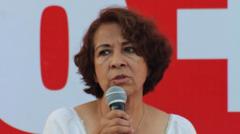NYPD intervenes after protesters occupy library, resulting in injuries and numerous arrests, drawing national attention to campus activism.
Pro-Palestinian Protesters Arrested Following Columbia University Library Siege

Pro-Palestinian Protesters Arrested Following Columbia University Library Siege
Dozens apprehended as tensions rise during protest at New York's prestigious Columbia University.
Dozens of pro-Palestinian protesters were arrested at Columbia University after they staged a protest occupying the Butler Library on Wednesday. As tensions escalated, two university security officers sustained injuries while attempting to manage the chaotic situation. University President Claire Shipman condemned the protesters' actions, labeling them "outrageous."
Footage disseminated on social media displayed a group of chanting protesters, many identifiable by keffiyeh headscarves and masks, as they entered the library, disregarding a prior ban imposed by the previous Trump administration. Shipman sought assistance from the New York Police Department (NYPD), noting that a significant number of the individuals apprehended were not current students.
Reports indicate that over 70 individuals were taken into custody, as confirmed by the campus newspaper Columbia Spectator. The NYPD, addressing the incident via social media platform X, acknowledged their involvement at the direct request of the university to manage an ongoing trespassing situation in the library.
Videos from the site captured scenes of protestors defacing bookshelves with graffiti reading “free Palestine.” Another recording displayed security officers stationed at the library's exit, demanding identification from those inside, leading to a tense standoff lasting several hours. President Shipman criticized the disruption of academic activities as students prepared for final exams, urging students to avoid the affected library.
New York City Mayor Eric Adams publicly condemned any form of hate or violence in the city, reinforcing the administration's commitment to maintaining peace on campus. Protestors countered online by accusing the university of engaging in “violent repression” and asserting their refusal to comply with police identification requests.
This standoff represents a significant incident in Columbia's history, marking the first time since April 2024 that the university has called in the NYPD to handle on-campus protests. These protests have drawn attention from political figures, including former President Donald Trump, who has previously criticized universities for their handling of antisemitism and threatened to cut federal funding to Columbia University.
Last year, Columbia emerged as a focal point for pro-Palestinian demonstrations against the backdrop of the Gaza conflict and U.S. support for Israel. As the current situation unfolds, the university community and national observers continue to grapple with the implications of these protests on academic freedom and institutional governance.























